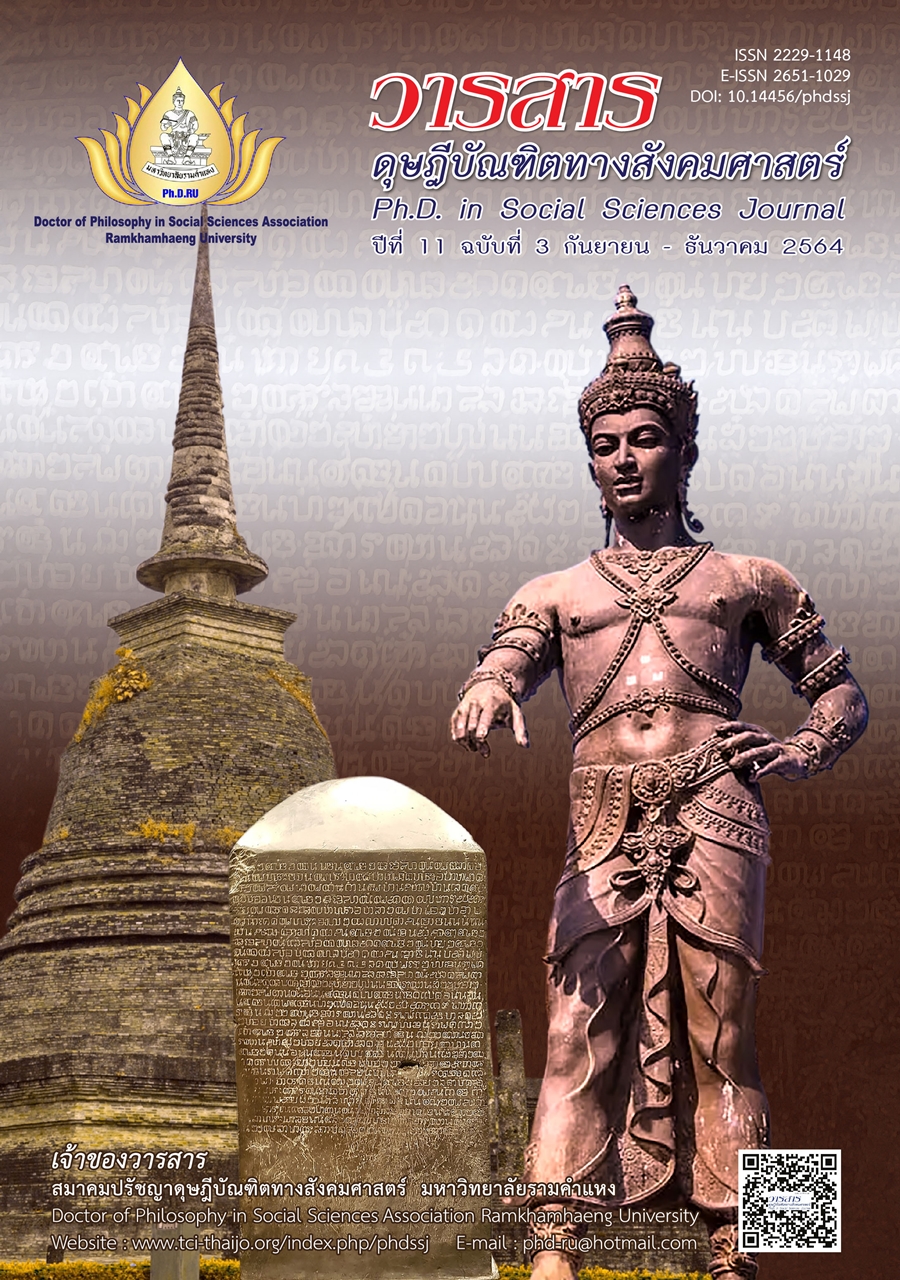The Relationships Between Positive Psychological Capital, Perceived Organizational Support, and Employee Engagement on the Organizational Citizenship Behaviors of Employees at a Private Company
Main Article Content
Abstract
In this research article has the objective to study and analyze the relationship between positive psychological capital, perceived organizational support, employee engagement, and the organizational citizenship behaviors of employees at a private company and to create a predictive equation for the organizational citizenship behaviors of employees at a private company. Positive psychological capital, perceived organizational support and employee engagement served as predictor variables. The sample population consisted of 222 employees from twelve work units at a private company. The research tool was a questionnaire and utilizing frequency, percentage, mean, and standard deviation. Pearson’s product-moment correlation coefficient method, and stepwise multiple regression analysis was also employed by the researcher.
Findings showed that the highest proportion of the employees under study were females between the ages of 25 and 30. The period of employment was less than a year. They exhibited a high level of positive psychological capital; perceived organizational support at a moderate level and employee engagement at a high level; and organizational citizenship behaviors at a high level, positive relationships with the organizational citizenship behaviors of the private company employees at the statistically significant level of .01, and positive psychological capital and employee engagement were jointly found to allow predictions of organizational citizenship behaviors at the statistically significant level of .01. The predictive power for organizational citizenship behaviors was at 23.0 percent.
Article Details
Academic articles, research articles, and book reviews in the Ph.D. in Social Sciences Journal are author’s opinions, and not the publisher’s, and is not the responsibility of the Ph.D. in Social Sciences Journal Philosophy Association, Ramkhamhaeng University. (In the case that research is done on human, the researcher has to be trained in Ethics for Doing Research on Human Training and has to produce the evidence of the training).
References
Ariani, D. W. (2013). Relationship between employee engagement, organizational citizenship behavior, and counterproductive work behavior. International Journal of Business Administration, 4(2), 46-56.
Eisenberger, R., Stinglhamber, F., Vandenberghe, C., Sucharski, I., & Rhoades, L. (2002). Perceived supervisor support: Contributions to perceived organizational support and employee retention. Journal of Applied Psychology, 87(3), 565-573.
Hewitt Associates. (2015). Say, stay, or strive? Unleash the engagement outcome you need. Retrieved from https://www.aon.com/unitedkingdom/attachments/trp/Drivers_of_Say_Stay_Strive_White_Paper_2015.pdf
Intaravichai, P. (2015). The effects of communication factors and flow at work to employee engagement and organizational citizenship behavior. Master’s Thesis of Arts, Thammasat University. [In Thai]
Jebeli, M. J., & Etebarian, A. (2015). The impact resilience and psychological well-being on organizational citizenship behavior (case study central municipality and areas 15 of Isfahan municipality). Journal of Zoology and Research, 5(1), 7-16.
Khanom, K. (2014). The relationship between job satisfaction and employee engagement of a state enterprise, the moderator effect of job involvement. Master’s Thesis of Arts, Thammasat University. [In Thai]
Luthans, F., Avolio, B. J., Avey, J. B., & Norman, S. M. (2007). Positive psychological capital: Measurement and relationship with performance and satisfaction. Personnel Psychology, 60(3), 541-572.
Luthans, F., & Youssef, C. M. (2004). Human, social, and now positive psychological capital management: Investing in people for competitive advantage. Organizational Dynamics, 33(2), 143-160.
Luthans, F., Youssef, C. M., & Avolio, B. J. (2007). Psychological capital. Oxford University Press.
Organ, D. W. (1991). The applied psychology of work behavior (4th ed.). R. R. Donnelly & Sons.
Organ, D. W., Podsakoff, P. M., & MacKenzie, S. B. (2006). Organizational citizenship behaviors its nature, antecedents, and consequences. Sage.
Plungklang, N. (2016). The relationships between psychological capital and organizational commitment and the organizational citizenship behaviors, of Pathum Thani provincial administration organization civil officials. Ph.D. in Social Sciences Journal, 7(2), 180-189. [In Thai]
Rhoades, L., & Eisenberger, R. (2002). Perceived organizational support: A review of the literature. Journal of Applied Psychology, 87(4), 698-714.
Rhoades, L., Eisenberger, R., & Armeli, S. (2001). Affective commitment to the organization: The contribution of perceived organizational support. Journal of Applied Psychology, 86(5), 825-836.
Rongklad, W. (2016). The relationships among organizational trust, perceived organizational support and organizational citizenship behavior of employees in a beverage and food company. Master’s Thesis of Arts, Thammasat University. [In Thai]
Seligman, M. E. P. (1998). Learned optimism. Pocket Books.
Soontronpukdee, A. (2016). Perceived organizational support, occupational self-efficacy and performance of sale persons in a food and beverage company with goal commitment as mediating variable. Master’s Thesis of Arts thesis, Thammasat University. [In Thai]
Thaikaeo, P. (2014). Relationship between character strength psychological capital and subjective well-being with organizational citizenship behavior. Master’s Thesis of Arts, Thammasat University. [In Thai]
Yamane, T. (1973). Statistics: An introductory analysis (3rd ed.). Harper & Row.


